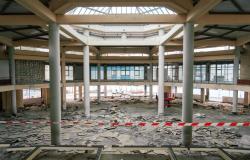A crisis management experiment with artificial intelligence was held this Wednesday, April 24, in specialized premises at IMT Mines-Alès.
Three large rooms at IMT Mines-Alès equipped with computers, telephones and large interactive screens. The place resembles crisis units that local authorities can establish to better coordinate actions in the face of serious events. That’s the point.
All day this Wednesday, April 24, around twenty people participated in a crisis management simulation. The scenario: a dazzling flood of Anduze by the Gardon that a municipal team must face. Everyone receives, in real time, data showing the evolution of the flood.
The experiment is played by two separate teams. Separated, to then analyze the different strategies put in place. Each team is organized around a coordinator who distributes tasks and directives. They are supervised by a third team of “game masters”, who decide on the continuation of the scenario and the unforeseen events that may happen during the disaster. They also play the role of the prefecture, the media and the firefighters in contact with the “commune”.
Significant training
Scientists, students, firefighters, employees of the Agglomeration and even an elected official from Anduze are among the teams in question. First deputy to Mayor Geneviève Blanc, Jacques Faïsse is, unfortunately, the only elected official invited to the experiment who was able to make the trip.
According to him, this day should not be considered wasted time: “This will bring us more organization”. Because he admits having already had to face disasters, “without experience or expertise. As soon as we arrived at town hall in 2020, we were faced with serious flooding. When we arrive and it happens to us like that, it can turn into improvisation.”
Midi Free – ALEXIS BETHUNE
Midi Free – ALEXIS BETHUNE
Soon with AI?
However, in addition to teaching, the game also serves as a place for experimenting with new technology. Because one of the groups, without knowing it, receives information from artificial intelligence. The other doesn’t. This “HydrIA” (such is its name) aims, according to its developers, to provide rapid and reliable forecasts on the evolution of the flood. The team that does not receive this information works with the “traditional” Vigicrues team.
“We will then examine the difference”summarizes Anne Johannet, director of the HydrIA research project. “During the simulation, we could quickly see that the teams’ achievements were different.”
These analyses, combined with others, should thus demonstrate the relevance and speed, or not, of the forecasts calculated by artificial intelligence. The hope here would be to have a future ally allowing field teams to better prepare and act better during interventions.
The “Simulcrisis” platform
This crisis management simulator has been present for several years in the premises of IMT Mines-Alès. Funded by the Occitanie Region and Europe, it offers the possibility to professional and institutional audiences (communities, businesses, civil security, teachers, etc.) to apply remote crisis management techniques, so that the best decisions can be made. taken to avoid as many tragedies as possible. The simulation can create various disaster scenarios, starting with floods and fires.







